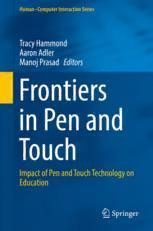Table Of ContentHuman–Computer Interaction Series
Tracy Hammond
Aaron Adler
Manoj Prasad Editors
Frontiers
in Pen and
Touch
Impact of Pen and Touch Technology on
Education
Human–Computer Interaction Series
Editors-in-chief
DesneyTan
MicrosoftResearch,USA
JeanVanderdonckt
UniversitécatholiquedeLouvain,Belgium
Moreinformationaboutthisseriesathttp://www.springer.com/series/6033
Tracy Hammond (cid:129) Aaron Adler (cid:129) Manoj Prasad
Editors
Frontiers in Pen and Touch
Impact of Pen and Touch Technology
on Education
123
Editors
TracyHammond AaronAdler
SketchRecognitionLab InformationandKnowledgeTechnologies
DepartmentofComputer RaytheonBBNTechnologies
Science&Engineering Columbia,MD,USA
TexasA&MUniversity
CollegeStation,TX,USA
ManojPrasad
Microsoft
Redmond,WA,USA
ISSN1571-5035
Human–ComputerInteractionSeries
ISBN978-3-319-64238-3 ISBN978-3-319-64239-0 (eBook)
DOI10.1007/978-3-319-64239-0
LibraryofCongressControlNumber:2017954388
©SpringerInternationalPublishingAG2017
Thisworkissubjecttocopyright.AllrightsarereservedbythePublisher,whetherthewholeorpartof
thematerialisconcerned,specificallytherightsoftranslation,reprinting,reuseofillustrations,recitation,
broadcasting,reproductiononmicrofilmsorinanyotherphysicalway,andtransmissionorinformation
storageandretrieval,electronicadaptation,computersoftware,orbysimilarordissimilarmethodology
nowknownorhereafterdeveloped.
Theuseofgeneraldescriptivenames,registerednames,trademarks,servicemarks,etc.inthispublication
doesnotimply,evenintheabsenceofaspecificstatement,thatsuchnamesareexemptfromtherelevant
protectivelawsandregulationsandthereforefreeforgeneraluse.
Thepublisher,theauthorsandtheeditorsaresafetoassumethattheadviceandinformationinthisbook
arebelievedtobetrueandaccurateatthedateofpublication.Neitherthepublishernortheauthorsor
theeditorsgiveawarranty,expressorimplied,withrespecttothematerialcontainedhereinorforany
errorsoromissionsthatmayhavebeenmade.Thepublisherremainsneutralwithregardtojurisdictional
claimsinpublishedmapsandinstitutionalaffiliations.
Printedonacid-freepaper
ThisSpringerimprintispublishedbySpringerNature
TheregisteredcompanyisSpringerInternationalPublishingAG
Theregisteredcompanyaddressis:Gewerbestrasse11,6330Cham,Switzerland
Foreword
The 2016 Conference on Pen and Touch Technology in Education was the tenth
annual iteration of this annual event. It was a special pleasure for me to chair the
conferenceatBrown,whereIalsoorganizedaworkshoponpencomputinginthe
spring of 2007 (see Fig.1), the forerunner of WIPTTE (now renamed CPTTE).
Some of this year’s speakers and attendees participated in that first workshop.
This year’s conference combined both researchers and educators exchanging best
practices. The conference featured the usual CPTTE blend of keynote speakers,
research papers, presentations by practicing teachers about techniques they have
foundworthwhileintheclassroom,andhands-onYou-Try-Itsessions.Participants
alsohadampleopportunitiestoconnectwithoneanothertoexploreideas,research
applications, and practices, allowing for a stimulating cross-pollination between
membersofthisdiversecommunity.
Microsoftcontinuestodominatethefieldwithitsofferingofhardware(Surface
tablets and the large Surface Hubs); platform support for digital ink, pen, and
touch interaction; and popular applications such as the OneNote family. Other
manufacturers such as Samsung, Fujitsu, and Wacom continue to expand their
product offerings, and even Apple, who eschewed the pen under Steve Job’s
leadership, has finally started offering the Apple Pencil for the iPad Pro models.
Classroomadoptionoftabletsgrowsslowlybutsteadilybuthasnotyethittheknee
of what we all still hope will be an exponential growth curve. As styli become
moreprevalent,therewillbegreaterinterestinexpandingtheminimalistinteraction
vocabularypopularizedbytheiPhoneanditscompetitors(tap,swipe,pinch-zoom)
by adding digital ink and character, gesture, and sketch recognition as first-class
citizens.ItisencouragingtoseecompanieslikeAdobeputtingincreasingemphasis
ontabletsratherthanjustdesktops.OurCPTTEkeynotersandspeakers,alongwith
theresultingpapersinthismanuscript,provideuswithinspirationandvisionsowe
cancontinuebuildinginterestandcommunityinthisstillyoungfield.
We are grateful to the many sponsors who have so generously funded us this
yearandwithoutwhomthiswholeaffairwouldhavebeenimpossible.Continuing
their support from WIPTTE 2015 (and previous years) are Microsoft (Windows,
v
vi Foreword
Fig.1 In 2007, a kick-off pen-centric computing workshop was held at Brown. Many of the
peopleintheinitialphotographattendedCPTTE2017andarestillinvolvedinthepen-computing
community
OneNote,Surface,andResearch)asplatinum-levelsponsor,FujitsuandWacomas
gold-levelsponsors,andPDFAnnotatorasbronze-levelsponsor.Allarevitaltothe
successofthisconference.ThanksarealsoowedtohostsponsorBrownUniversity,
inparticulartheDepartmentofComputerScienceandtheOfficeofUniversityEvent
andConferenceServices.
It’s a pleasure to acknowledge here the hard work put in by all of the mem-
bers of the organizing committee. I especially want to acknowledge last year’s
organizer/chair Jonathan Grudin; program co-chairs Aaron Adler, Mark Payton,
and Manoj Prasad; program committee member Eric Hamilton; past chair Tracy
Hammond; conference coordinator Lisa Manekofsky; and the rest of the CPTTE
2016 Organizing Committee. The amount of work done by these folks has been
wellbeyondreasonable,andwesimplywouldnotbeherewithouttheirefforts.
Thankyouallforcontributing—welcometowhatwehopeyouwillfindtobea
stimulatingexchangeofideas.
CPTTE2016Chair Dr.AndyvanDam
Foreword vii
Dr.AndyvanDam:AndriesvanDamistheThomas
J. Watson Jr. university professor of technology and
educationandprofessorofcomputerscienceatBrown
University.HehasbeenamemberofBrown’sfaculty
since 1965, was a cofounder of Brown’s Department
of Computer Science and its first chairman from
1979 to 1985, and was also Brown’s first vice pres-
ident for research from 2002 to 2006. His research
includesworkoncomputergraphics;hypermediasys-
tems; post-WIMP and natural user interfaces (NUI),
including pen and touch computing; and educational
software. He has been working for over four decades on systems for creating
and reading electronic books with interactive illustrations for use in teaching and
research. In 1967 Prof. van Dam cofounded ACM SICGRAPH (the precursor
of SIGGRAPH) and from 1985 through 1987 was chairman of the Computing
Research Association. He is a fellow of ACM, IEEE, and AAAS and a member
of the National Academy of Engineering and the American Academy of Arts and
Sciences.HehasreceivedtheACMKarlV.KarlstromOutstandingEducatorAward,
the SIGGRAPH Steven A. Coons Award for Outstanding Creative Contributions
to Computer Graphics, and the IEEE Centennial Medal and holds four honorary
doctoratesfromDarmstadtTechnicalUniversityinGermany,SwarthmoreCollege,
the University of Waterloo in Canada, and ETH Zurich. He has authored or
coauthoredover100papersandninebooks,includingFundamentalsofInteractive
Computer Graphics and three editions of Computer Graphics: Principles and
Practice.
Contents
PartI IntroductionsandWelcome
1 Introduction:FrontiersinPenandTouchResearch ................... 3
TracyHammond,AaronAdler,ManojPrasad,andAnnaStepanova
PartII MathForAll:ElementaryMath
2 ClassroomLearningPartner:Pen-BasedSoftwareforCreating
andSharingVisualRepresentations...................................... 27
KimberleKoile,AndeeRubin,StevenChapman,andLilyKo
3 MachineAnalysisofArraySkipCountinginElementaryMath ..... 31
KimberleKoile,AndeeRubin,andStevenChapman
4 TouchCountsandGestureDesign ........................................ 51
NicholasJackiwandNathalieSinclair
PartIII MathForAll:HighSchoolandCollegeMath
5 SketchBasedInteractionTechniquesforChartCreationand
Manipulation................................................................ 65
AndrésN.VargasGonzález,EugeneM.TarantaII,
andJosephJ.LaViolaJr.
6 DigitizingMathematicalSymbolismThroughPenandTouch
Technology: A Beginning Taxonomy of Affordances for
LearnerFlowinMathematics............................................. 83
EricHamilton
7 SketchingGraphsinaCalculusMOOC:PreliminaryResults........ 93
JenniferFrench,MartinA.Segado,andPhillipZ.Ai
ix
x Contents
PartIV Personalized Feedback and Sketching in Science and
Engineering
8 TabletPCGoal-DirectedPracticeCoupledwithReal-Time
TargetedFeedbackEnhancesFoodChemistryLearning.............. 105
EnriquePalou,JudithV.GutierrezCuba,NellyRamirez-Corona,
andAurelioLopez-Malo
9 Score Improvement Distribution When Using Sketch
RecognitionSoftware(Mechanix)asaTutor:Assessmentofa
HighSchoolClassroomPilot.............................................. 125
RandyBrooks,JungInKoh,SethPolsley,andTracyHammond
10 DCSR:ADigitalCircuitSketchRecognitionSystem
forEducation................................................................ 137
ShuoMa,YongbinSun,PengchenLyu,SethPolsley,
andTracyHammond
11 An Intelligent Sketching Interface for Education Using
GeographicInformationSystems......................................... 147
AqibNiazBhat,GirishKasiviswanathan,ChristyMariaMathew,
SethPolsley,ErikProut,DanielW.Goldberg,andTracyHammond
PartV IncreasingLiberalArtsEngagementandLearningwith
Sketch
12 InsightsfromExplorationofEngagingTechnologiestoTeach
ReadingandWriting:StoryBaker....................................... 167
MichelPahud
13 AMultilingualSketch-BasedSudokuGamewithReal-Time
Recognition.................................................................. 187
CaioD.D.Monteiro,MeenakshiNarayanan,SethPolsley,
andTracyHammond
PartVI Let’sCollaborate
14 NuSys:CollaborativeInsightExtractiononSharedWorkspaces..... 199
PhilippEichmann
15 CollaborativeSpaces:OneNoteintheMiddleSchoolClassroom.... 203
SaraMata
PartVII DomainIndependentEducationalTools
16 DesignConsiderationsforaLargeDisplayTouchApplication
inInformalEducation...................................................... 217
LucyVanKleunen,TrentGreen,MirandaChao,TiffanyCitra,
andCarleneNiguidula

